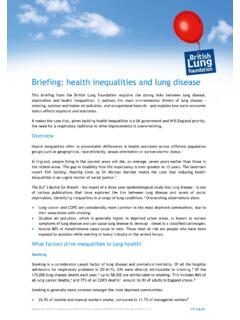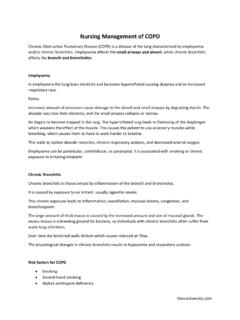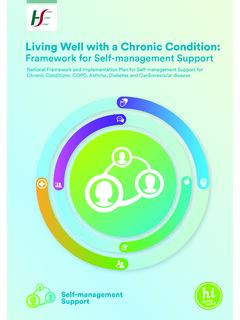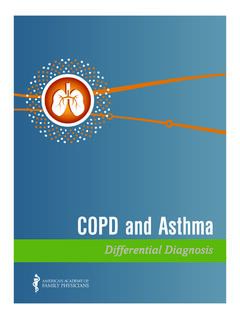Transcription of Your COPD self-management plan - British Lung Foundation
1 Ur CO PD self - management planvisit plan belongs to:First name: Surname: Telephone: Mobile: NHS number: Allergies: Dates of last vaccinations (flu, pneumonia, coronavirus).
2 In case of emergency, please contact:First name: Surname: Relationship to you: Tel: Mobile: Email: My doctor is: At: (Name of the clinic or hospital where your doctor works)Tel: About you ContactNameTelephoneOther contactsYou can put the contact details of other people you may need to contact on this example: a specialist nurse, GP, pharmacist or physiotherapist an out-of-hours clinic or emergency contact a friend, neighbour or family member you can call on for help a transport provider or taxi firm you use to get to your appointments34call our helpline on 03000 030 555visit this self - management planThis plan is for people living with chronic obstructive pulmonary disease ( copd ).
3 It s designed to help you learn about copd , manage and monitor your symptoms, and take control of your works best when supported by others. So share this plan with your GP, respiratory nurse or other health care professionals involved in your care. It may also help to discuss this with your family, carers, and friends, so they can support you first half of this self - management plan explains what copd is, how you can manage it well, and what to do if you have a flare-up of your symptoms. The second half of this plan has blank forms for you to complete to help you monitor your condition and progress. Use this plan in the way that works best for you daily, weekly, monthly. It doesn t need to be completed overnight!In this planUnderstanding and managing your COPDYour copd care ..6 What is copd ? .. 8 copd symptoms .. 9 copd medication.
4 10 Looking after yourself .. 12 Managing breathlessness .. 15 Managing flare-ups .. 16 Monitoring your conditionYour flare-up action plan .. 18 Flare-up tracker .. 20 Medicine diary .. 22 Symptoms diary .. 24 Record of your mood .. 26 Setting goals and tracking your progress .. 28 This resource has been endorsed by:6call our helpline on 03000 030 555visit My diagnosis of copd was confirmed with a breathing test called I know what copd is. I know where to find information, advice and emotional support (if I need it). 3. I get support to manage my care. I have agreed a written plan with my doctor or nurse about how I will manage my Every year I ask my doctor for a free flu jab. I have had a one-off pneumonia jab and will talk to my health care professional about the COVID-19 If I smoke, I m offered help to stop every time I meet my doctor or nurse about my I know the importance of keeping active and eating well.
5 I have had a chance to go to pulmonary rehabilitation (PR).7. I know what all my medicines and inhalers are for and when to take them. I will ask my doctor, nurse or pharmacist if I m not My doctor or nurse looks at how I use my inhaler at least once a year. I ask my pharmacist if I have I have a flare-up plan , including a rescue pack of medicines if I need them. This is so I know what to do and who to contact if my symptoms get worse I see my nurse or doctor at least once a year to review my health, my care and my treatment, and have time to discuss all the steps in this checklist. Understanding and managing your COPDWhy is self - management important?When you have a long-term condition, you might sometimes feel you don t have control over your health, your life and what happens to you. self -managing your condition with support from others helps to give you control.
6 It helps to know all about your condition, your symptoms, your medication and how to cope with flare-ups. It also makes your day-to-day life easier and could reduce the risk of needing to go into copd careYou should be able to tick all of the statements on the opposite page. If you can t, you may be missing out on care which could significantly improve your health and quality of life. In this case, ask for a review with your practice nurse or GP. If you need to, bring this list to your next appointment. It will remind you what to ask your health care our helpline on 03000 030 555visit is copd ? copd stands for chronic obstructive pulmonary disease. It describes a group of lung conditions that make it difficult to empty air out of the lungs because the airways have become = it s a long term conditionObstructive = your airways are narrowedPulmonary = it affects your lungsDisease = it s a medical conditionTwo of these lung conditions are long-term (or chronic) bronchitis and emphysema, which can often occur sacs break downinflammation and excess sputumhealthy airwaysairways with persistent bronchitishealthy air sacsair sacs with emphysemaRead more about copd at are the symptoms of copd ?
7 People can experience copd differently. Symptoms may include: getting short of breath easily when you do everyday things such as going for a walk or doing housework having a cough that lasts a long time producing more sputum or phlegm than usual wheezing in cold might have symptoms all the time. Or they might appear or get worse when you have an infection. They can also be triggered by: smoking or being in a smoky environment weather conditions, such as very hot or cold temperatures air pollution, such as exhaust fumes and dust aerosols, such as hair spray, deodorants and air freshener strong smells, such as bleach and perfumes you know what makes your symptoms worse, you can try to avoid the trigger. Keeping a record of your symptoms, like the one on page 24, can help you recognise what s normal and what s not. It s useful even when you re symptom free, so you ll understand more about your condition.
8 Share it with your health care professional to help them understand how you re affected by your s vital you know when you need advice from your health care professional, and when you need to go to hospital. Discuss this with your health care our helpline on 03000 030 555visit for COPDI nhalersYour doctor may give you medicines in inhalers: to open your airways. These are called bronchodilators to reduce inflammation in your airways. These are called steroids If you only get short of breath when you re active, your doctor or nurse will give you a short-acting bronchodilator. This will help your breathing quickly and the effects last for 4 to 6 you re breathless every day, you may benefit from being prescribed long-acting bronchodilator medications. These should be taken regularly - once or twice a day depending on which brand you re using.
9 Some people need to use inhaled steroids as part of their treatment. This is to reduce inflammation in the airways and reduce the risk of flare-ups. They are also useful for people whose condition is an overlap of asthma and s a good idea to talk to your health care professional about which inhaler is right for you. There are different factors to consider, including how well the medication works for you and any environmental concerns. Read more about medication for copd at will only get the best benefit from your medicines if you use your inhaler correctly. Our sister charity, Asthma UK, has videos to help you check and improve your inhaler technique at and nebulisersTo help get as much medication into your airways as possible, you may be given a device called a spacer to use with your inhaler. A few people with copd may also take medication through a nebuliser.
10 If you use either, use as instructed and clean it regularly following the manufacturer s instructions. Read more at you cough up a lot of sputum, you may be given a drug called a mucolytic as a tablet or syrup. This may make your sputum thinner and easier to cough therapy is a treatment for persistent low blood oxygen levels, not breathlessness. Read more at medicationAs part of your flare-up action plan , your health care professional may prescribe you a rescue pack of drugs you keep at home. Read more about this on page vaccinatedMake sure you get your free flu jab every year. You should also be vaccinated against pneumonia. Most people only need to have this vaccine once. Vaccination is available for the COVID-19 virus. Speak to your pharmacist, doctor or nurse for more information on the vaccine and when you should have tips for managing your medicationMake sure you know the names of all your medications, dosage and how to take them.









